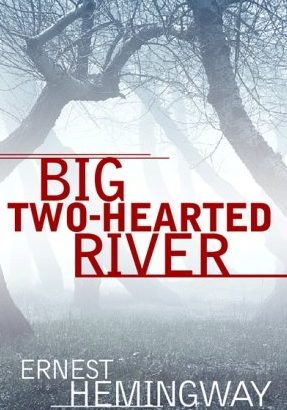
When I think of PTSD, I immediately think of war veterans and how they face PTSD when they come home from the war. The flashbacks, the nightmares, and the distress one faces is traumatic and is hard to overcome. Memory is apart of PTSD, as people recall events and they go in and out of their stream of consciousness. My knowledge about what the war veterans go through has increasingly grew because of the readings and discussions I’ve had in my ASTU class.

A couple weeks ago, in ASTU class, we were assigned to read a short story “Big Two Hearted River” written by Ernest Hemingway. When I read the short story, my initial reaction to the character, Nick Adams was that he was very odd and very interested in nature. It later all made sense, once I was told that Nick came back from the war, which explained his unique behaviour. Hemingway has an interesting writing style as he wants the reader to engage in the book by finding the meaningful information which is not presented clearly in the story. This is the theory of omission, where the most important thing in literature should be omitted and not written. As a reader, that makes you frustrated but also curious forming many observations. As the reader we grasp the latent content, but the manifest content is where we have to think and find the hidden messages. To me, it kind of sounds like the game of hide and seek, but in literature. The story is very descriptive and has this feeling of tension as if something is about to happen, but nothing happens.
This short story shows how Nick is living his life by not talking about his life after the war, but projecting it through nature and objects. The river is an analog for a constantly relaxed consciousness which relates to his mind constantly experiencing new things. The water constantly flows, and so does his model of thinking. Nick is seen to be very repetitive, which is seen when he comes in contact with blackened grasshoppers which resembles traumatized soldiers. Hemingway provides a pathway for us to see the things Nick is not thinking of which I find very interesting. In his mind, Nick has anxiety over these grasshoppers as the natural beings have been affected which relates to soldiers being affected by the war. I believe that the swamp is the dark place in his mind where all the repressed emotions are lying in his mind. The swamp is unlike the river, the water is still, and the components in the swamp are not clear. When he is faced with the swamp, he feels this anxiety and needs to get away from the trauma.

A war veteran projecting his repressed emotions on objects was also seen in the book, Mrs. Dalloway by Virginia Woolf. Throughout the book, we receive many perspectives through different characters whether their the main character or a side character. This provides us with an insight with many opinions on situations, however I found it to be a bit hard to follow. Honestly, I didn’t like the book, although I did like how Woolf chose the style of different narrators, because that gave the reader a closer connection towards the various characters.
The character Septimus Warren Smith, is a war veteran who served in World War I and faces PTSD, which is evident throughout the book. He specifically suffers from shell shock and this causes him to have repetition compulsions. Some characters from the book, comment on Septimus’s behaviour and seem not to understand it and define it as odd. Suffering from shell shock, Septimus is seen to have moral failure as when he dies, Dr.Homes yells “that coward.” The failure of masculinity is seen as he gives up on his wife who loved and cared for him. Septimus suffers from hallucinations of his dead friend Evans. I am not a psychologist, but I believe the reason behind Septimus having these repressed emotions about Evans is due to him not confronting these emotions when he heard Evans died. These emotions are coming back to him through PTSD, and are constantly going through his mind. Septimus remembering memories of the past contrasts with the other characters remembering memories, due his memories causing harm to himself.
Unlike Nick Adams, Septimus openly talks about these repetitive compulsions and emotions which creates this bubble for him. On the other hand Nick, tries to not think about these emotions out loud but thinks of them internally. Septimus and Nick are both alike by projecting on nature. Septimus projects on trees and words like ‘time’, whereas Nick projects on grasshoppers, trout, the river, and the tent. Nick and Septimus have this nature versus war sensations which is embedded in their model of the mind. I find it very intriguing that Nick and Septimus can have these moments where they can look at an object and flash into another ‘reality’ and it become so real to them. They can looks at objects and their mind instantly transports into another dimension of thinking. They have these flights, where they have these compulsions and then they go back to perches, where they come back to reality. Both characters have these overloading sensations, however Septimus’s sensations (spoiler alert) sends him to his death bed. Septimus chooses to keep these sensations which is embedded in his soul and makes the choice to commit suicide. I believe that in Mrs. Dalloway, the doctor was trying to hide Septimus due to his PTSD as it was seen as a threat to society, so the treatment of being sent away was seen as fit. I think it would be interesting if these two characters met and had conversations about what they experience. Nick could actually talk about these expressed emotions out loud and Septimus would have someone who he can relate to and would not feel alone.